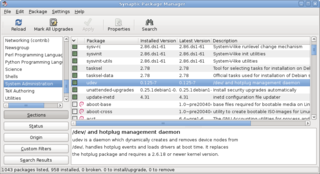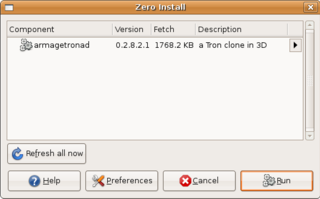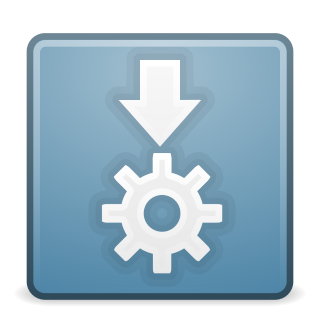
A Linux distribution is an operating system made from a software collection that includes the Linux kernel and often a package management system. Linux users usually obtain their operating system by downloading one of the Linux distributions, which are available for a wide variety of systems ranging from embedded devices and personal computers to powerful supercomputers.

A package manager or package-management system is a collection of software tools that automates the process of installing, upgrading, configuring, and removing computer programs for a computer in a consistent manner.

Advanced package tool, or APT, is a free-software user interface that works with core libraries to handle the installation and removal of software on Debian, and Debian-based Linux distributions. APT simplifies the process of managing software on Unix-like computer systems by automating the retrieval, configuration and installation of software packages, either from precompiled files or by compiling source code.

The Linux Standard Base (LSB) was a joint project by several Linux distributions under the organizational structure of the Linux Foundation to standardize the software system structure, including the Filesystem Hierarchy Standard. LSB was based on the POSIX specification, the Single UNIX Specification (SUS), and several other open standards, but extended them in certain areas.

Zero Install is a means of distributing and packaging software for multiple operating systems.

Ubuntu is a Linux distribution based on Debian and composed mostly of free and open-source software. Ubuntu is officially released in multiple editions: Desktop, Server, and Core for Internet of things devices and robots. The operating system is developed by the British company Canonical, and a community of other developers, under a meritocratic governance model. As of October 2023, the most-recent release is 23.10, and the current long-term support release is 22.04.

Autopackage is a free computer package management system aimed at making it simple to create a package that can be installed on all Linux distributions, created by Mike Hearn around 2002.

AppImage is a format for distributing portable software on Linux without needing superuser permissions to install the application. It aims to enable application developers to deploy binary software without being restricted to specific Linux distributions, a concept often referred to as upstream packaging. In this manner, a single developed software can effortlessly run on any Linux distribution, such as Ubuntu, RHEL, or Arch.

A portable application, sometimes also called standalone, is a program designed to operate without changing other files or requiring other software to be installed. In this way, it can be easily added to, run, and removed from any compatible computer without setup or side-effects.

Compiz is a compositing window manager for the X Window System, using 3D graphics hardware to create fast compositing desktop effects for window management. Effects, such as a minimization animation or a cube workspace, are implemented as loadable plugins. Because it conforms to the ICCCM conventions, Compiz can be used as a substitute for the default Mutter or Metacity, when using GNOME Panel, or KWin in KDE Plasma Workspaces. Internally Compiz uses the OpenGL library as the interface to the graphics hardware.

Wubi is a free software Ubuntu installer, that was the official Windows-based software, from 2008 until 2013, to install Ubuntu from within Windows, to a single file within an existing Windows partition.

PackageKit is a free and open-source suite of software applications designed to provide a consistent and high-level front end for a number of different package management systems. PackageKit was created by Richard Hughes in 2007, and first introduced into an operating system as a default application in May 2008 with the release of Fedora 9.

Ubuntu Netbook Edition (UNE), known as Ubuntu Netbook Remix (UNR) prior to the release of Ubuntu 10.04, is a discontinued version of the Ubuntu operating system (OS) that had been optimized to enable it to work better on netbooks and other devices with small screens or with the Intel Atom CPU.

Ubiquity is the default installer for Ubuntu and its derivatives. It is run from the Live CD or USB and can be triggered to run from the options on the device or on the desktop of the Live mode. It was first introduced in Ubuntu 6.06 LTS "Dapper Drake". At program start, it allows the user to change the language to a local language if they prefer. It is designed to be easy to use.

SMPlayer is a cross-platform graphical front-end for MPlayer and mpv and forks of Mplayer using GUI widgets offered by Qt. SMPlayer is free and open-source software subject to the terms of the GNU General Public License version 2 or later. SMplayer has been localized in more than 30 languages.

AppStream is an agreement between major Linux vendors to create an infrastructure for application installers on Linux and sharing of metadata.
SuperX is a Linux distribution, a computer operating system originally developed in India. SuperX uses a tweaked version of KDE and is aimed towards beginners and casual users. SuperX features a new launcher made in QML that allows users to get a grid view of all icons of the installed applications in the system, the new launcher is called "SuperX App Launcher".

Snap is a software packaging and deployment system developed by Canonical for operating systems that use the Linux kernel and the systemd init system. The packages, called snaps, and the tool for using them, snapd, work across a range of Linux distributions and allow upstream software developers to distribute their applications directly to users. Snaps are self-contained applications running in a sandbox with mediated access to the host system. Snap was originally released for cloud applications but was later ported to also work for Internet of Things devices and desktop applications.

Windows Subsystem for Linux (WSL) is a feature of Windows that allows developers to run a Linux environment without the need for a separate virtual machine or dual booting. There are two versions of WSL: WSL 1 and WSL 2. WSL 1 was first released on August 2, 2016, and acts as a compatibility layer for running Linux binary executables by implementing Linux system calls on the Windows kernel. It is available on Windows 10, Windows 10 LTSB/LTSC, Windows 11, Windows Server 2016, Windows Server 2019 and Windows Server 2022.
















